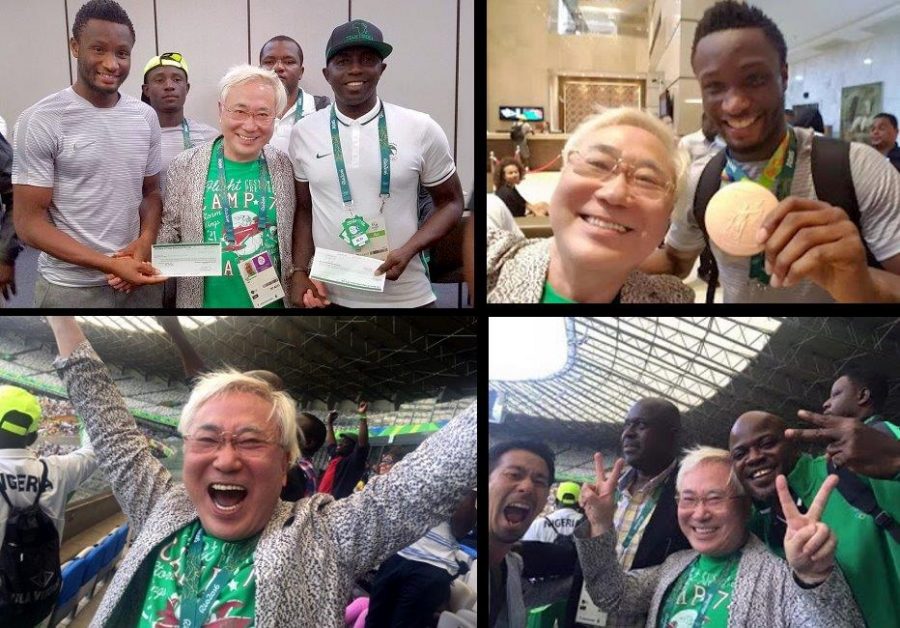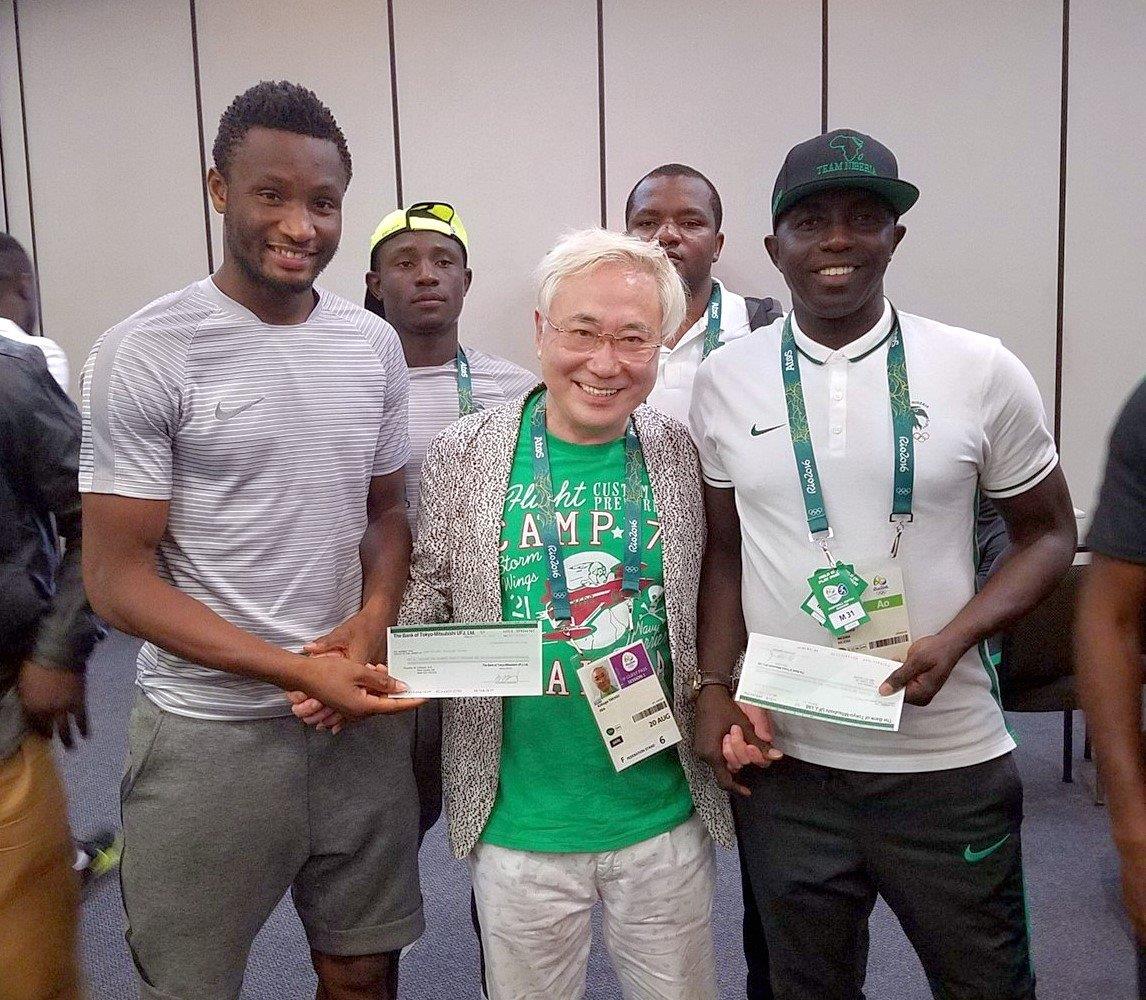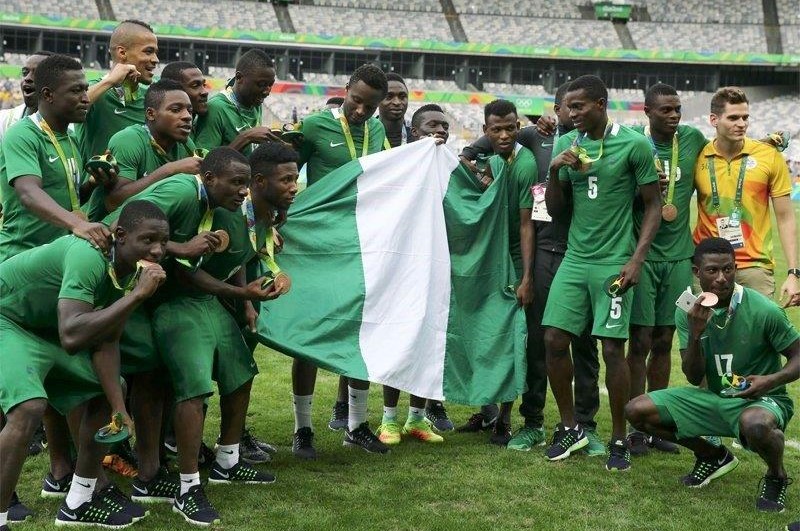SUB-TITLE: When It Takes A Foreigner To Reward Nigeria’s Heroes: Questions For Those In Charge
Japanese Surgeon Katsuya Takasu Rewards Nigeria’s Soccer Dream Team VI For Rio Olympics Bronze Medal Performance: Reminds Nigerians of Patriotism, Responsibility, & Appreciation.
You must have heard that a “non-Nigerian” from Japan came forward to reward the management and players of Nigeria’s “dream VI” soccer team for their efforts at the Rio Olympics (winning Nigeria’s only medal at Rio 2016). That is after many tales of woe and lack of payment by the Nigerian authorities in charge. A case of Nigerians being reminded of reason, responsibility, and patriotism by a “non-Nigerian.”
For many it is hard to fathom that it would take the gesture of a foreigner for Nigeria’s soccer heroes to be appreciated and rewarded while Nigeria’s sports ministry and the football federation were busy passing blames and shunning responsibility, and the National Assembly has been preoccupied with the “budget padding” scandal.
After the 2014 world cup when Nigeria went through similar players protest and payment saga, this writer called on both the authorities and the players to put country first, stating; “No national team that is divided in its objectives, distracted in its focus, or partially motivated in its zeal will ever win a world tournament like the world cup.” This time around the saga surrounding the treatment or ramshackle care provided to Nigeria’s contingent to the Olympics especially the soccer team leads one to question the integrity, patriotism, and priorities of those in charge at the helm of Nigeria’s sports ministry and football federation.
To some extent, the involvement of the Japanese Surgeon Katsuya Takasu in the saga may have indicted not just the sports ministry and football federation, but also the so called “wealthy” Nigerians many of whom claim to be sports lovers. Perhaps they were waiting for the team to return home, but for all we know they watched from the sidelines as a foreigner stole the show.
At a time when life is becoming harder for the average Nigerian and many could barely get their three square meals a day, Japanese Surgeon Katsuya Takasu may have reminded many Nigerians who own SEVERAL expensive houses, fleets of cars, and investments around the world (more than they could ever use), that wealth is useless if it does nothing to lift the people around us.
Nigeria’s ELECTED leaders are perhaps the HIGHEST PAID in the world, whose feeding, clothing, or transportation bonuses run into hundreds of millions of Naira, yet only a foreigner saw and took this opportunity to show true leadership by example.
The more unfortunate story is that no one has been held responsible. Perhaps, no sincere apologies to the players and the Nigerian populace have been made. Accordingly, no lessons seem to have been learned and no corrections appear likely to be made. Rather we hear about denials and accusations about who did or did not do what. About who knew what or did not know what about the mess even before the shameful experience played out on the international arena. It appears this kind of saga will yet happen again.
And so this piece will go further to ask – what do we do besides writing, complaining, excusing, or blaming others for what went wrong? What can we do to make things better?
• What could the current and future leaders do besides pretending to be ashamed anytime the payment saga incident happens?
• Will they be more interested in providing for the team and the nation or would they be more interested in what would be in it for them?
• What will the leaders entrusted with governance in Nigeria do to encourage younger and future generation Nigerians that representing the country should be a thing of honor that is appreciated by the leaders of the country?
Is it that difficult for those in charge to know; that athletes make a living from sports and that representing the country Nigeria does not mean the athlete should starve or train on a hungry stomach?
• that to win laurels the leadership must invest in improving training facilities and equipments that would help produce better competitors;
• that if we expect patriotic zeal to reign among our sports ambassadors we must enable a conducive environment and state of mind where patriotism would thrive.
• that athletes are representatives and reflective of what obtains in a country which is ironically reflected in how such representatives are treated.
After all said and done, few simple questions persist. How long is it going to be before Nigerians witness yet another payment saga? What can be done to prevent another repeat of this shame? Are we going to wait again for a foreigner to come forth to remind us of patriotism and our responsibilities?
***
An African Events publication



